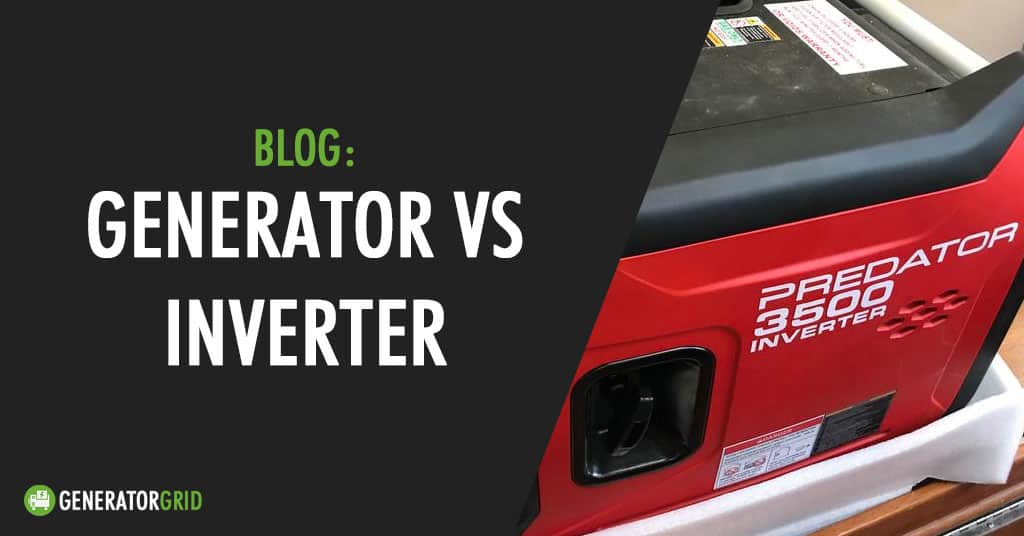Last Updated on July 25, 2022 by Manager Access

For those who are in the market for a generator, knowing the difference between a conventional generator and an inverter generator can help make your purchasing decision much easier.
The biggest factor in choosing the best solution is going to be the amount of power you are going to need.
As a rule of thumb, conventional generators are usually capable of supporting more wattage than inverter generators. Inverter generators are going to be best suited for your lower wattage, smaller electronics.
How Does A Conventional Generator Work?
 A conventional generator runs on gasoline, diesel, or propane and will have an alternator with an electrical output.
A conventional generator runs on gasoline, diesel, or propane and will have an alternator with an electrical output.
You can even choose from a hybrid generator that will allow you the ability to run your generator on two different types of fuels.
Conventional generators are designed to run at 3600rpm and generate 120 volts at a frequency of 60 hertz.
You can find conventional generators in the wattage range of 300 watts up to 10,000+ watts.
This wide range of wattage capabilities makes it easy for you to find the perfect generator for your application.
How Does An Inverter Generator Work?
An inverter generator is one of the newer offerings in the generator industry, using more advanced technology. This allows the generator to output AC current much like conventional generators, and then converted to DC voltage, which is then inverted back to clean AC voltage.
This process allows you to get “clean” energy supplied to your electronics at a more stable flow.
Electricity generated from an inverter generator is about the same quality of electricity as you would get from your main electrical supplier.
My #1 pick for a great overall portable inverter generator would be the Honda EU2200i.
Differences Between A Conventional Generator & Inverter Generator
So now that we have looked at how each type of generator works, it’s time to take a look at the main differences between the two.
Taking a look at these differences will allow you to make a more informed purchasing decision for your specific needs. Some of the qualities that we will be looking at will be current, fuel efficiency, portability, noise, price, and emissions.
1. Current
When looking at conventional and inverter generators, the main difference is going to be the way that it produces current.
The conventional generators are going to product strictly AC electricity in a single phase while inverter generators are going to have 3 phases that converts energy from AC to DC, back to a stable AC current.
The unstable sine wave from a conventional generator can damage sensitive electronics, while an inverter generator has a much more stable sine wave that is ideal for charging laptops, cell phones, and other small electronics.
2. Power/Fuel Efficiency
Due to the larger size of conventional generators, you are going to get to enjoy longer runtimes and larger wattage capacities. This is in thanks to the larger fuel tanks and engines found on these types of generators. Inverter generators are going to be more energy efficient as the engine can automatically adjust to the load. Since they are more fuel efficient, they use smaller fuel tanks to achieve similar run times when comparing gallon to hour.
This is typically one of the biggest selling points on a generator and it must be a factor you take into consideration when thinking about what your want to use your generator for.
3. Portability
Since conventional generators are usually larger, inverter generators are generally more portable. With larger frames, tanks, and engine, conventional generators can become quite heavy.
For most heavier generators, you are going to get wheels and a collapsible handle for easier transportation, but for loading a generator up into a truck or car, an inverter generator is most likely going to be your lightest options.
Most inverter generators can be picked up and carried around by a single person.
4. Noise
If you are planning to use your generator within earshot of others, such as your backyard or at a campsite, a generator’s noise level should be heavily considered when making a purchase.
Conventional generators are notoriously loud and most of the time, the larger the generator, the louder it is going to be.
Conventional generators utilize larger engines which can reach up to 80 db when measured from 23 feet away (the industry standard).
Inverter generators are relatively quiet when compared to conventional generators thanks to the advanced technology that they use.
5. Price
Generator costs are another big factor that comes into play when finding one that will fit your budget. Conventional generators are usually the most affordable option as the technology utilized in inverter generators are more expensive.
However, the price of a conventional generator can quickly exceed your budget as the wattage capability goes up. The more that a generator can handle, the larger the engine is going to be which drives up the overall cost.
6. Emissions
When looking for a generator, you will need to take into consideration your local laws and regulations.
Both conventional and inverter generators come in EPA compliant forms, but if you live in California, you will need to ensure you find one that is CARB legal as well.
Conventional generators are usually going to produce more greenhouse gases than inverter generators.
Inverter Generator Uses
Since inverter generators are great for smaller electronics, an inverter generator is best used on camping trips or tailgating parties where you will not be using larger appliances.
You can use an inverter generator to safely charge cell phones, laptops, tablets, cameras, and power TVs.
Conventional Generator Uses
Conventional generators are a little more universal as they can be used to power just about anything within its wattage capacity.
Conventional generators can be used for smaller jobs like home backup power to larger jobs such as powering multiple tools and lights on a job site.
Which Is Better? Conventional Generator or Inverter Generator?
Since inverter and conventional generators are so different and can be used for a variety of different applications, finding the best of the two is going to depend on what you will be using it for.By taking into consideration all of the characteristics I have discussed, you should be able to find the best generator for your needs.

Scott Krager purchased generatorgrid.com in the summer of 2020 and quickly began to buy every generator under the sun! He currently has over a dozen generators and the number is growing quickly. He lives in Portland, OR near his family and friends.
GeneratorGrid.com is an independent review business. I am not affiliated with any manufacturers and do not accept paid reviews. When you buy through my links, I may earn a commission which helps me purchase more generators for testing. - Scott Krager

